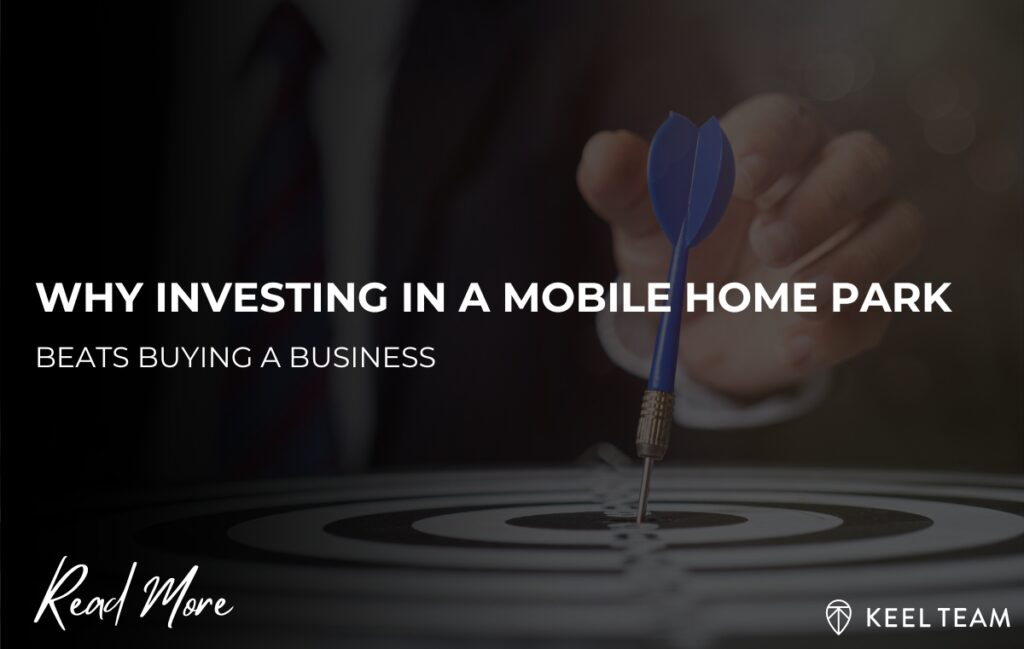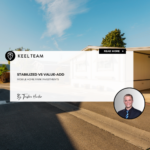Why Investing in a Mobile Home Park Beats Buying a Business
-
 Tristan Hunter - Investor Relations
Tristan Hunter - Investor Relations

Introduction
Building an additional stream of income or even replacing a day job often boils down to two primary options: buying income properties or investing in a business or franchise. Among these choices, income properties, especially mobile home parks, stand out as the superior investment option. This article explores why investing in a mobile home park can offer more potential advantages than buying a business or franchise.
Hard-Asset Backed Security
Investing in a mobile home park means your money is typically protected by valuable real estate. In contrast, purchasing a business or franchise offers minimal tangible assets. For instance, if you buy a franchise you get some equipment and a leased building, but very little in the way of substantial assets. The significant difference here is that a mobile home park investment is secured by real estate, while a business or franchise lacks this essential backing.
Real estate provides a solid foundation for your investment. Land and property typically appreciate over time, and they can offer a level of security that businesses or franchises cannot match. This inherent value in the land means that even if the mobile home park doesn’t perform as expected, the underlying asset still holds considerable value. On the other hand, businesses and franchises can become worthless if they fail to generate income, leaving you with little to no tangible assets.
Easier Financing Options
This distinction is also evident in financing opportunities. When you purchase a mobile home park, you can often secure a loan for about 75-80% of the purchase price on a 25-year amortization. Banks are more willing to lend in this scenario because they can use the real estate as collateral. Conversely, securing a loan for a business or franchise is challenging due to the lack of tangible property to use as security. This financing advantage allows you to likely leverage your capital more effectively when buying a mobile home park.
The ability to obtain financing is crucial for investors looking to maximize their capital. With a mobile home park, the substantial backing of real estate typically makes lenders more comfortable extending loans. This leverage means you can potentially acquire a higher-value property with less initial capital, possibly amplifying your potential returns. In contrast, the general lack of significant assets in a business or franchise makes financing difficult, limiting your ability to scale and grow your investment.
Download our FREE eBook! Learn valuable insights on mobile home park investing from Andrew Keel.
Independence from Employee Performance
Mobile home parks generate income primarily from land rent, not from the efforts of employees. This contrasts sharply with businesses or franchises, where income is heavily reliant on employee performance. In a mobile home park, your revenue comes from tenants paying rent to park their homes, independent of employee actions. This usually reduces the risks associated with employee management, such as absenteeism or poor performance, which can directly impact a business or franchise’s profitability.
Employees are a significant variable in the success of any business or franchise. High turnover rates, lack of motivation, and other human resource challenges can severely affect the bottom line. Mobile home parks, however, operate with minimal reliance on staff, albeit the on-site manager. The primary source of income—rent—is consistent and predictable, potentially allowing for a more stable revenue stream. This operational simplicity typically translates to fewer headaches and lower management costs.
Betting on Affordable Housing
Affordable housing is a critical need in America today, and mobile home parks meet this demand effectively. With rising housing costs, mobile home parks offer a cost-effective alternative, with average rents significantly lower than apartment rents. This demand for affordable housing positions mobile home parks as a potentially stable and lucrative investment, unlike many businesses or franchises struggling in the current economic climate.
The demand for affordable housing continues to grow as more people seek economical living options. Mobile home parks provide a solution to this problem, offering housing at a fraction of the cost of traditional apartments. Generally, this affordability helps contribute to a steady stream of tenants and a low vacancy rate. In contrast, many businesses and franchises face fluctuating demand and competition, which can impact their revenue stability. By investing in mobile home parks, you align your investment with a fundamental societal need, potentially enhancing the long-term viability of your income stream.
Low Failure Rate
Statistics highlight the stark difference in success rates between small businesses and mobile home parks. Small businesses have a failure rate of 65% to 80%, while mobile home parks boast the lowest default rate in commercial real estate. This reliability is due to the intrinsic value of real estate and the consistent demand for affordable housing. Therefore, investing in a mobile home park can be seen as a safer and more reliable option compared to a business or franchise.
The high failure rate of small businesses can be attributed to various factors, including market competition, operational challenges, and economic downturns. Mobile home parks, on the other hand, typically benefit from a more stable and resilient market. The consistent demand for affordable housing provides a buffer against economic fluctuations, potentially ensuring a more predictable income stream. This stability makes mobile home parks a more attractive investment for those seeking long-term security.

Additional Benefits of Mobile Home Park Investments
Apart from the major advantages mentioned, mobile home parks offer several other potential benefits. These include lower operating costs, tax advantages, and the potential for value-add opportunities. Mobile home parks typically have lower maintenance and repair costs compared to other forms of real estate, as tenants own their homes and are responsible for their upkeep. This helps reduce the financial burden on trailer park owners.
Tax benefits also play a significant role in the attractiveness of mobile home park investments. Depreciation deductions can typically offset a substantial portion of your income, potentially reducing your overall tax liability. Additionally, mobile home parks often appreciate in value over time, providing opportunities for capital gains upon sale.
Value-add opportunities in mobile home parks are numerous. By improving infrastructure, amenities, and management practices, you can potentially increase the property’s value and rental income. Simple upgrades, such as adding playgrounds, laundry facilities, or enhanced security, can attract higher-paying tenants and boost occupancy rates.
Conclusion
When weighing the options of mobile home park investing versus buying a business or franchise, the advantages of mobile home parks become clear. These investments often offer tangible asset security, easier financing, independence from employee performance, and a stable demand for affordable housing. While not all mobile home parks may be suitable for investment, those with the right infrastructure, location, and economic factors can significantly outperform traditional businesses or franchises.
By investing in mobile home parks, you are aligning your financial goals with a stable and growing market. The inherent value of real estate, combined with the consistent demand for affordable housing, makes mobile home parks a potentially reliable and lucrative investment option. As you consider your investment strategies, keep in mind the numerous benefits that mobile home parks offer over traditional businesses or franchises.
Learn more about mobile home park investing.
Interested in learning more about mobile home park investing? Get in touch with us today to find out more.
Disclaimer:
The information provided is for informational purposes only and is not investment advice or a guarantee of any kind. We do not guarantee profitability. Make investment decisions based on your own research and consult registered financial and legal professionals. We are not registered financial or legal professionals and do not provide personalized investment recommendations.

Tristan Hunter - Investor Relations
View The Previous or Next Post
Subscribe Below 👇





